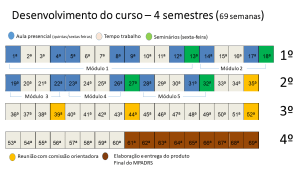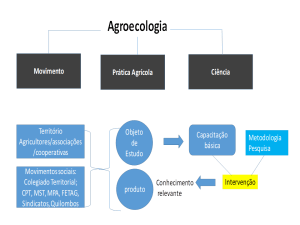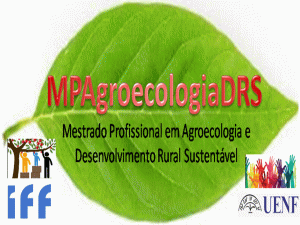Our Master’s Program in Agroecology and Sustainable Rural Development is taught by faculty members from different Centers of the State University of Northern Rio de Janeiro Darcy Ribeiro (UENF) and the Fluminense Federal Institute (IFF), Cambuci campus. This graduate program (stricto sensu) is the result of a partnership between UENF and IFF, as well as various civil society organizations.
This tuition-free master’s program, offered in a professional modality, allows graduates to enhance their knowledge while balancing their studies with their weekly workload. The program is focused on ecological principles through Agroecology, aiming for more sustainable rural practices. Agroecology, an innovative and transdisciplinary science, provides the scientific foundations for in-depth analyses of agroecosystems to better balance economic gains, social responsibility, and environmental care. Thus, the program fosters dialogue with rural and urban communities and organizations, facilitating an exchange of knowledge—and, why not, flavors.
Agroecologists study issues related to the four key properties of agroecosystems: productivity, stability, sustainability, and equity. Unlike disciplines that focus on only one or a few of these aspects, agroecologists consider all four as interconnected and essential for the success of agroecosystems.
Program Integration
1. Institutional Integration
The MPADRS program is linked to the Center for Agricultural Sciences and Technologies (CCTA/UENF) and the Office of Research and Graduate Studies. It maintains a collaboration agreement with IFF (Cambuci campus) and is supported internally by faculty and researchers from other UENF Knowledge Centers (CBB and CCH) in the areas of ecology and human sciences (sociology, philosophy, and social policies). The program was approved in December 2023 by CAPES, under Agricultural Sciences I (Area 42), with a concentration in Agroecology and a subarea of “Rural Extension, Development, and Sustainability.”
2. Social Integration
The MPADRS program has a strong social foundation, responding to an explicit demand from 38 civil society organizations that make up the Territorial Collegiate of Northern Rio de Janeiro. Additionally, it collaborates closely with agricultural movements and organizations, including:
•Comissão Pastoral da Terra (CPT)
•FETAG (Federation of Agricultural Workers)
•CONTAG (National Confederation of Agricultural Workers)
•Movimento de Pequenos Agricultores (Small Farmers’ Movement)
•Cooperatives, Associations, and Rural Workers’ Unions
•Movimento dos Trabalhadores Rurais Sem Terra (Landless Rural Workers’ Movement – MST)
Training (Skills and Competencies)
The MPADRS program offers multidisciplinary training for ATER professionals (Technical Assistance and Rural Extension). It follows the Statute and Regulations of UENF’s Graduate Studies.
The program provides a set of core courses, which are structured as interconnected modules of knowledge. The training process follows an alternation system, balancing coursework at MPADRS/UENF with the professional’s work commitments. Under this system, students can be absent for two consecutive weeks without needing formal notification to the program or the Office of Research and Graduate Studies, as outlined in the program’s regulations (attached to this proposal).
Core Modules
The MPADRS program consists of five core training modules:
1.Fundamentals of Agroecology
2.Ecological Soil Management
3.Health of Agroecological Systems
4.Society and Development
5.Food and Food Security
Each module aims to develop specific skills and competencies, equipping students with the knowledge necessary to design agroecological systems as a tool for sustainable rural development. The content of each module (research lines) is detailed in the curriculum section. The Individual Training Path of each student is outlined in Figure 1.

Figure 1. Schematic representation of the Individual Training Path in the Master’s Program in Agroecology and Sustainable Rural Development. Classes are held on Thursdays and Fridays, with two-week intervals for work-based learning.
Research and Application
The training process is centered around the research theme, which serves as the student’s research focus. To address the multidimensional nature of agroecology, the program applies the strategic concept of research relevance.
For the MPADRS program, a relevant research topic is one that addresses the needs of social agents (public and private) within the Northern Rio de Janeiro Territory Collegiate or the student’s local community. This means that research topics are proposed by farmers and their representative organizations.
This demand-driven research will guide the student throughout their training. The training model is represented in Figure 2.
Notably, the program’s structure is built from the end goal backward—meaning it is extension-oriented. Research topics are defined based on real-world problems identified by social movements, ensuring that the scientific training provided by the modules equips students with the necessary tools for real-world intervention.
This applied research approach is central to the final graduation project, which ultimately aims to promote concrete rural development within target communities.

Figure 2. Representation of the scientific-pedagogical project guiding the training of the professional master’s program in Agroecology and Sustainable Rural Development.

